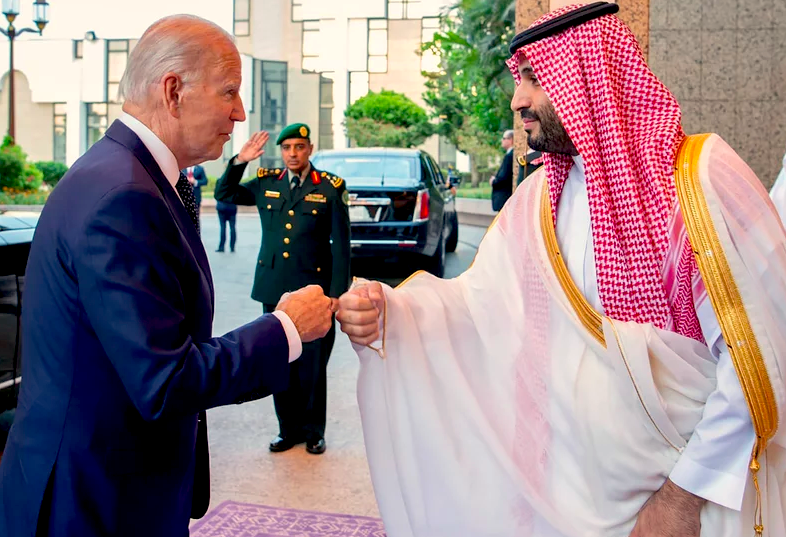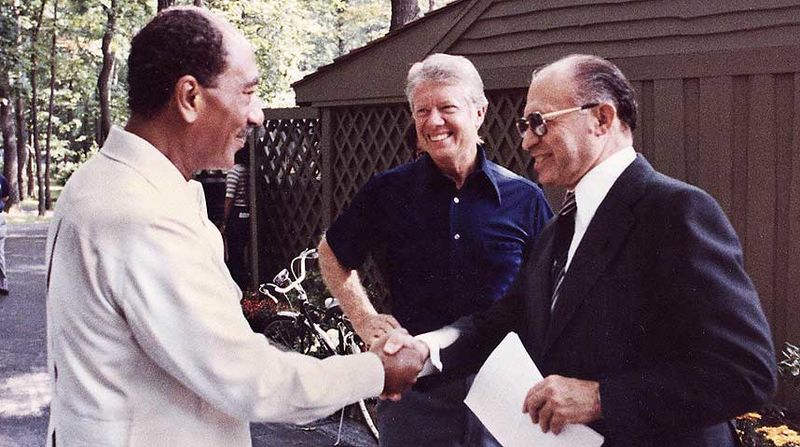The White House is committing itself to the survival and longevity of one of the most totalitarian regimes in the region, and the world.

Biden and Saudi Crown Prince Mohammed bin Salman bin Abdulaziz bumping fists in Jeddah on July 15, 2022. (Saudi Press Agency, Wikimedia Commons, CC BY 4.0)

If concluded, the U.S. will be committing itself not to the security of the Saudi kingdom and its people, but to the survival and longevity of one of the most totalitarian regimes in the region, and the world.
The Abraham Accords, initiated by the Trump administration, were predicated on the recognition that the Arab people are not in any way eager or interested in making peace with Israel.
The Zionist lobby has long reached this conclusion and acted accordingly.
From President Jimmy Carter onwards, successive U.S. administrations have calculated that the best guarantee of peace with Israel in the region is through propping up authoritarian regimes that can impose peace with Israel on their people and can protect the precious Israeli embassy in their midst.
We saw that once the heavy hand of oppression was lifted in Egypt in 2011, one of the first acts of the free Egyptians was to storm the Israeli embassy and set it on fire. It was only after the U.S. government threatened the Egyptian military with a halt to U.S. aid, that the military acted against the wishes of the population and protected the embassy and whisked its spies and saboteurs outside the country.
The Biden administration has wholeheartedly endorsed the Trump-Kushner foreign policy in the Middle East region. On all key points, it has stuck to the path of the previous administration in dealing with the Middle East and the Arab-Israeli conflict:
No. 1) It refused to revive the Iran nuclear agreement despite pledges to the contrary during the Biden campaign. It engaged in indirect negotiations with Iran but insisted on adding more concessions from Iran that were part of the objections that Republicans had raised back in 2015.
No. 2) it refused to re-open the PLO office in Washington, D.C., although the PLO has become (since the Clinton administration) a mere tool of the U.S. and acts in the service of the Israeli occupation army. The PLO had even amended its charter according to specific instructions of the Clinton administration and Israel. The PLO today stands in opposition to the real representatives of the Palestinians people.
No. 3) The U.S. administration didn’t return the U.S. embassy to Tel Aviv from Jerusalem, thereby sticking to the demand of the Christian Right and the Israeli embassy. The U.S. has now committed itself to the recognition of Israeli sovereignty over Jerusalem.
No. 4) The U.S. government did not declare Israeli settlements in the West Bank as being in contradiction with international law (which was the classic characterization by U.S. administrations since 1967 until the George W. Bush administration).
No. 5) The U.S. government did not reverse Trump’s policy of accepting Israeli sovereignty over the occupied Golan Heights.
No. 6) The Biden administration stuck to the model of Donald Trump’s son-in-law, Jared Kushner, of ignoring the Palestinian problem altogether and seeking instead separate bilateral peace treaties between Israeli and Gulf despots.
This notion of the bilateral deals with Israel fits in with Jake Sullivan’s view right before Oct. 7 (in an article in Foreign Affairs), that the Middle East is “quieter today than it has been in two decades.” He only said that because he assumed that peace with Gulf despots would kill the Palestinian quest for independence and statehood.

Aug. 31, 2020: Abraham Accords delegation on the first direct El-Al flight to the UAE from Ben Gurion Airport; at center is Trump Senior Advisor Jared Kushner, on right is National Security Advisor Robert O’Brien. (Matty Stern/U.S. Embassy Jerusalem, CC BY 2.0)
That Punishment Pledge
The story is now well-known, how Biden, while campaigning in 2020, pledged to punish the Saudi regime which he characterized as a pariah. He said that he could not find one redeeming quality in Muhammad Bin Salman, the actual ruler who is guilty not only of the murder and dismemberment of Washington Post columnist Jamal Khashoggi, but also of gross human rights violations throughout the region. (Yemen was until Oct. 7, 2023, the biggest humanitarian crisis in the world, and the U.S. administration was complicit in that from the Obama administration days).
In the wake of Oct. 7, Western allies of Israel have realized that the Palestinian problem is more central than ever to the politics of the region and to the stability of the world. It is rather inexplicable then that the Biden administration would continue to pursue the discredited path of the Abraham Accords.
Even when Israel continues in its war of genocide, the Biden administration has consistently pursued talks with Saudi Arabia, not over a solution to the Palestinian problem, but over the best methods to achieve Saudi-Israeli peace.
The Israel Lobby’s Flawed Premise

Yahya Sinwar, commander of Hamas in the Gaza Strip, shaking hands with a soldier in December 2023. (Fars Media Corporation, Wikimedia Commons, CC BY 4.0)
The premise of the Israel lobby on that potential deal is flawed. It assumes that the Saudi regime genuinely speaks on behalf of the Arab and Muslim people, and that the Saudi government can “deliver,” so to say, the Palestinian people.
It has been proven in the events of the last several months, that the Saudi regime does not hold any sway over the Palestinian people and that Iran has more credibility among Palestinian leaders and factions in Gaza than the Saudi regime.
The Saudi government does have influence with Mahmoud Abbas, president of the Palestinian National Authority, and his corrupt cronies in Ramallah; they are perceived by their people as mere spies and collaborators who serve the agenda of the occupation.
The Saudi government can deliver Abbas but can’t deliver Yahya Sinwar, the Hamas leader and undisputed leader of the Palestinians (if not of the Arab people in general).
The security agreement that the U.S. is negotiating has been modified to take into consideration an important fact: that Israel is not willing to accept, even in principle, a Palestinian state in return for full normalization with Saudi Arabia.
All factions in Israel are united in rejecting the Arab peace initiative which was engineered by Saudi Arabia in 2002. Even Yitzhak Rabin, who is lauded in the West as a real champion of peace despite his war criminal record, never uttered the words “Palestinian state.”
Israel wants peace with Arab despotic regimes in return for nothing, and with U.S. pressure it has succeeded in that regard. No Arab government received benefits from peace with Israel, unless one counts lavish U.S. funding of the security-military apparatus and the ruling despotic clique as achievements.
We saw in the developments in Rafah that even the Camp David agreement was not taken seriously by Israel, which recently moved tanks and armor to an area from which it is prohibited, according to its agreement with Egypt.

Egyptian President Anwar Sadat, U.S. President Jimmy Carter and Israeli Prime Minister Menachem Begin at Camp David in September 1978. (Wikimedia Commons)
The Biden administration will now have to settle for a bilateral U.S.-Saudi security deal which will please Congress but may upset the Israel lobby, which is willing to accept a security deal for the Saudi regime but only after it signs a peace treaty with Israel.
Israel is not even willing to accept a permanent cease-fire in return for a Saudi peace agreement.
But the Biden administration will be committing the U.S. (and its armed forces) to the defense of the Saudi regime not only vis-à-vis external threats (i.e. Iran) but also vis-à-vis the population of Saudi Arabia.
Those agreements are meaningless: what will the U.S. do, and what can it do, if an internal upheaval were to oust the Saudi king or the Saudi royal family altogether?
The example of the shah of Iran is still illustrative: a strategic agreement between the shah and the U.S. (which extended over decades) could not save the shah and could not fend off dangers from the people toward the regime.
The Biden administration will also be agreeing to the installation of a nuclear reactor in Saudi Arabia without conditions. It will be agreeing to the sale of advanced military technology to Saudi Arabia, which the U.A.E. regime had asked for itself when it agreed to the Abraham Accords.
Those accords will not affect the lives of the Palestinians and will only embolden Israel to commit more atrocities and war crimes.
The Biden administration has become one of the worst administrations in the history of U.S. foreign policy in the Middle East; it has not only fully participated in the Israeli war of genocide but it has also given more U.S. support to the perpetuation of Arab despotic order in the interest of Israel and its lobby in D.C.
As`ad AbuKhalil is a Lebanese-American professor of political science at California State University, Stanislaus. He is the author of the Historical Dictionary of Lebanon (1998), Bin Laden, Islam and America’s New War on Terrorism (2002), The Battle for Saudi Arabia (2004) and ran the popular The Angry Arab blog.

No comments:
Post a Comment